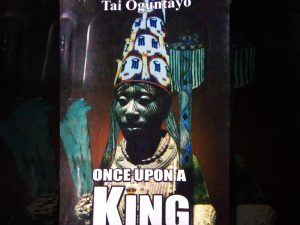Book Title: Once Upon a King
Year: 2017
Publisher: COTAI Communications Network
Author: Akogun Tai Oguntayo
Reviewer: Yusuf BM
The book, Once upon a King, is a play in four Acts and each Act has three scenes, except Act four with two scenes. The theme of the work bothers on chaos, betrayal, death, corruption and more. The playwright captivates the reader with the various themes giving each scene a philosophical dish of contemporary thoughts although with the utilization of the Yoruba traditional setting. But, what does the play encapsulate? It is an avid projection of a kind king, his corrupt and cunning chiefs. The youths of the village are also often antagonistic to the rules and regulations offered by their elders and the king. There is usually a conflict of interests.
The setting of the play is in the western part of Nigeria (that is the Yoruba). It portrays their culture and tradition so well. For instance, respect for the conventions of traditions makes it compulsory for the consultation of IFA (Oracle) in any matter, the sacrifices to Esu Odara (The god that resides at the crossroad) and many others. The play also inculpates the issues of leadership, both political and traditional because there are political issues such as embezzlement and misappropriation of funds.
In Act 1, the reader witnesses the restless attitude of the king due to the chaos in the land, the death of his chiefs and the struggles of the king toward the development of the community. Relating this to our contemporary society, it is expected that a great leader be concerned and up and doing in the development of his or her community. If our current crop of leaders are like the Kabiyesi portrayed in the play, our dear society would be a better place to dwell. We won’t have a comfortable leader when there is bad road in our country today, the leader we are supposed to have is one who will be restlessly in search of possible solutions to the problems bedeviling the country.

In Act 2, while it is true in difficult circumstances that leaders are forced to go against their will; the real leaders are always the ones that make such drastic decisions for development sake. In this act, the king is forced into polygamy because the king habitually travels out of the town with his queen leaving the kingdom with no sign of authority. He was forced to marry another wife with the backing of his wife, although against his will and desire for matrimony. In another vein, in this same act, the king brought many developments to the community but met dissatisfaction from the youths. The energy of the youths was a subtle one; yet, venomous. Rather than channel it to the right path, they made themselves destructive instruments in the hand of their youth leader. It is relevant to state that the youths need to realize their roles as advocates of good governance and not agents of public destruction and unrest.
In Act 3, the king is blackmailed and the plan to dethrone the king is concocted. This is another serious part of the play as issues began to go haywire for the king. It is said that in all good you do as a leader, there will always be an enemy and you can never satisfy humans. There was gossip around the community concerning the king.
In Act 4, there are three major themes in the final act: betrayal, death and payback. Sometimes as a leader you don’t really need to trust anyone at all because at times the person you so trust will be the one to betray you. It is stated in the play that it is an abomination for the king to see the last old cloth he wore before he became a king because if it happens the king will die within seven days. The messenger of the king whom the king trusted so much was the one who betrayed the king by luring him to go see the cloth, which led the king to visit death before death visited him. For retribution sake, the author did justice by killing the betrayer and according to the ending; others who connived to kill the king will follow.
Summarily, Oba Adeleye Oyindamola was a faithful king of the Ayegbege community and ever since he became the king of that community, the community was ravaged with underdevelopment and chaos. According to consultations made by the chief priest also known as LORI AWO, the IFA (The Oracle) revealed that Kabiyesi will only find peace for ten years after. Ten years came but with bad situations. Even with that the King tried so much in restoring many things with the help of one of his chiefs – Chief Igirabata who is also the representative of the community ward in the House of Representatives. The Kabiyesi was able to bring developments like: General Hospital, Magistrate Court and more to the community but at the end the king was later betrayed by one of his trusted chiefs – ‘Emese Oba’ (The Chief Messenger) by offering him a forbidden material, which was the king’s old cloth before he became a king, this led the king to commit suicide.
It is important to acknowledge the sequential arrangement of the scenes, except for the author’s ‘wicked ending’- (pardon me to use that word). Why will the author kill this great character, the king? It was later indicated towards the ending of the book that the kingmakers connived to make Oba Oyindanola a king but he still didn’t deserve to die because he brought development to the community. Every author shouldn’t be like Abubakar Ibrahim Adam who killed Reza in his book (Which book?). King Oyindamola deserves something better and not death which is the destiny gifted to him by the author. The book tends towards the promotion of indigenous culture and heritage of the Yoruba people, irrespective of its tragic end.
Bio:
Yusuf BM is a poet, writer, blogger, graphic designer, motivational speaker and a photographer from Minna, Niger state. He is the author of the poetry book, Brittle Songs. Yusuf is a member of the Hilltop Creative Arts foundation, Association of Nigerian Authors (ANA) SEVHAGE Publishers and Northern Writers’ Forum as well as Founder/CEO of Giant Tori-Tori Media Plus. He is known for his love for Photo-journalism and Phonetography.

